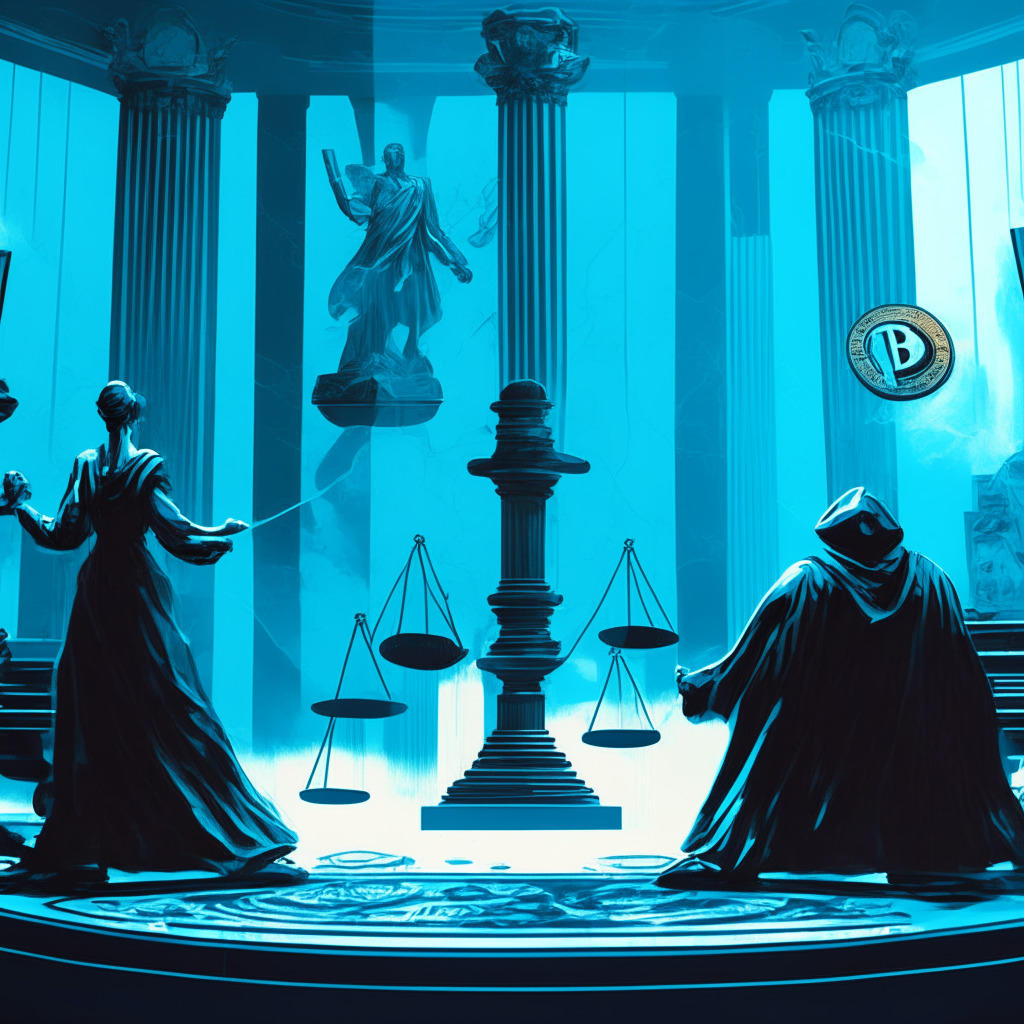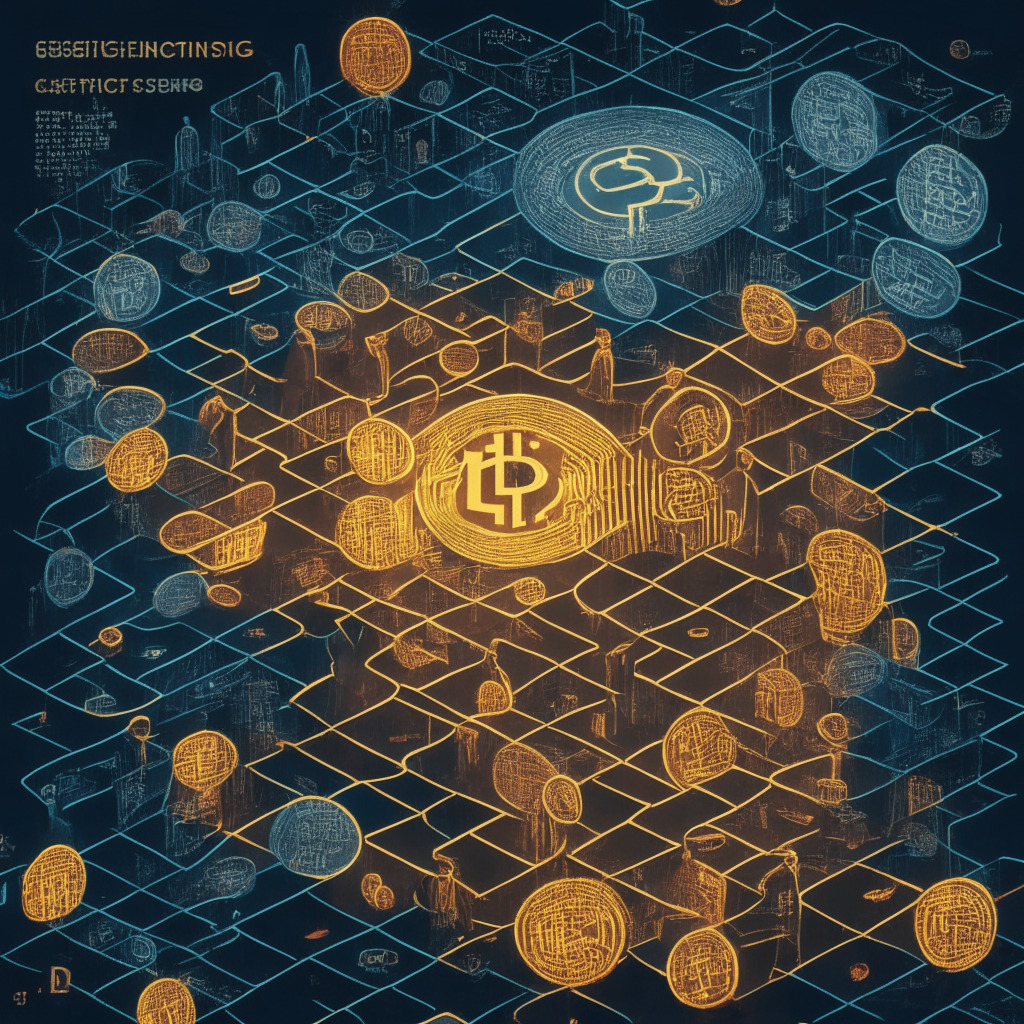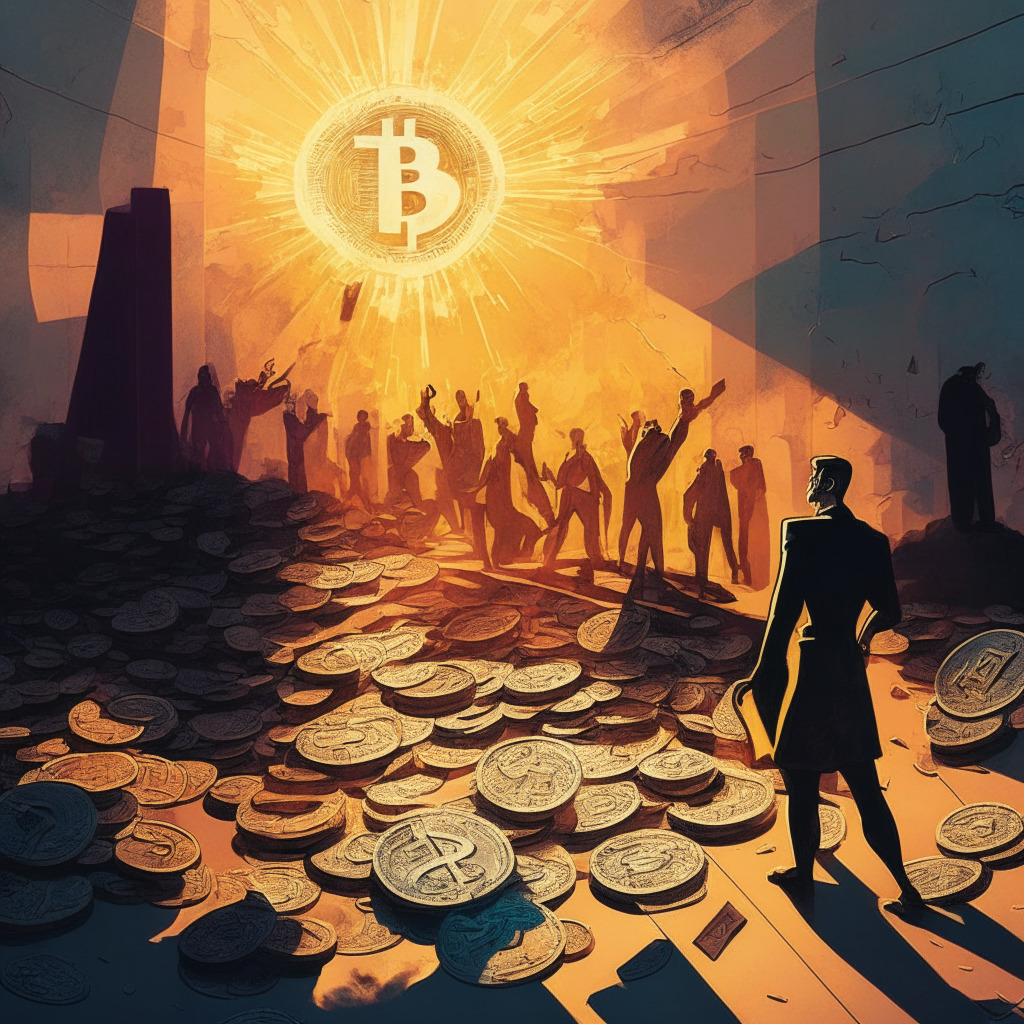The Custodia Bank case could introduce new regulatory standards for banks working with digital assets, potentially impacting the wider cryptocurrency industry. The outcome may affect the sector’s stability, growth, and the balance between regulation and innovation.
Search Results for: ZA Bank
Custodia’s Battle with Fed: Crypto Banking’s Future and Tension with Traditional Finance
Custodia’s legal battle with the Federal Reserve Bank of Kansas City has critical implications for state-chartered, crypto-friendly banks seeking access to the Fed’s services. The ongoing saga highlights the broader conflict between traditional financial institutions and cryptocurrency enthusiasts regarding potential destabilization and embracing innovation in digital currencies.
De-Dollarization: Implications for Crypto, Gold and the Global Financial System
De-dollarization is gaining momentum, with countries seeking alternatives to the U.S. dollar for international transactions and debt settlements. This shift could create opportunities for assets like gold and cryptocurrencies, but also carries risks, such as market instability and challenges in adopting disruptive forms of money.
ConsenSys Legal Battle: Shareholder Vote, Corporate Maneuvering, and Decentralization Dilemma
The legal battle between ConsenSys and 35 former employees over allegations of transferring core assets and devaluing shares has broader implications for the essence of blockchain technology and highlights the challenges crypto companies face balancing decentralization and corporate maneuvering.
Commonwealth Bank’s Crypto Payment Limits: Balancing Safety vs Market Growth
Commonwealth Bank (CBA) plans to reject or temporarily withhold specific payments to crypto trading platforms, setting a monthly limit of A$10,000 for customer payments to protect from scams. As regulations in Australia are considered, banks and governments strive to balance growing crypto interest with customer protection.
Binance-SEC Lawsuit: $70 Billion Moved Through Bankrupt Banks – Regulation & Transparency Debate
A Bloomberg report reveals that Binance and its affiliates moved $70 billion through Silvergate Bank and Signature Bank, raising concerns about funds movement transparency and banks’ role in the crypto industry. The SEC’s case against Binance alleges mishandling of client funds, while the exchange claims the transfers were part of regular business operations.
Bitcoin’s Resurgence Amid De-Dollarization and Binance SEC Lawsuit: Analyzing Market Dynamics
Bitcoin has rebounded to $27,000 following the SEC’s lawsuit against Binance, which initially caused a market dip. In a report, TD senior economist Vikram Rai highlighted central bank digital currencies, the euro, and the Chinese yuan as potential challengers to the US dollar’s dominance, noting that digital currencies could weaken the dollar’s position as a means of payment.
Crypto Scams and Shadow Banking: Lessons from Reginald Fowler’s $700M Conviction
The Manhattan federal court convicted ex-Minnesota Vikings co-owner Reginald Fowler in a $700 million crypto scam, highlighting the dangers of unregulated cryptocurrency transactions and shadow banking activities. Fowler’s case emphasizes the need for government and regulatory action to prevent fraud and protect the stability of the financial system.
SEC Lawsuits Against Crypto Exchanges: Compliance Battle or Decentralization Catalyst?
The SEC’s recent lawsuits against Binance and Coinbase raise questions about the future of crypto exchanges. As regulatory enforcement tightens over concerns regarding compliance, transparency, and customer protection, the effects on the crypto landscape may be far-reaching, with centralized exchanges possibly having to adopt more stringent KYC protocols and resemble fintech firms and banks.
Swift, Chainlink, and Banks: Unlocking Blockchain’s Future in Finance
Swift, Chainlink, and major financial institutions like ANZ, BNP Paribas, and BNY Mellon are collaborating to explore blockchain technology’s potential in transferring tokenized assets across networks. The experiment aims to increase market liquidity and contribute to the blockchain industry’s growth beyond single-digit trillions.
Blockchain Future: Decentralization, Security Risks, and Environmental Impact Explored
Blockchain technology holds potential for improving systems, creating new markets, and boosting security, yet it faces limitations. Decentralization poses regulatory challenges, implementation vulnerabilities expose users to risks, and energy-intensive mining raises environmental concerns. A balanced conversation leading to responsible implementation is crucial for a sustainable and secure digital future.
Blockchain Revolution in Banking Meets AI-Generated Fraud: Unleashing Potential or Unraveling Trust?
JPMorgan collaborates with six Indian banks to enable real-time interbank dollar settlements on its blockchain-based platform, Onyx. However, concerns emerge over AI-generated fraud in the crypto and blockchain sectors. Meanwhile, the UK’s APPG proposes recommendations for crypto regulation, and the US Treasury Department’s sanctions on Tornado Cash face legal challenges.
JPMorgan Partners with Indian Banks: Blockchain’s Game-Changing Impact on Dollar Transfers
JPMorgan partners with six major Indian banks to introduce a blockchain-based platform for 24/7 dollar transfers, aiming to provide instant transactions and enhance interbank settlement systems. The pilot project, launching on June 5th, uses JPMorgan’s Onyx platform and could potentially revolutionize the financial landscape.
JPMorgan’s Blockchain Partnership With Indian Banks: Pros, Cons & GIFT City’s Future
JPMorgan Chase partners with six major Indian banks to launch a blockchain-based platform for settling interbank dollar transactions, aiming to enhance efficiency and expedite transactions. The pilot project utilizing JPMorgan’s Onyx platform is scheduled to start on Monday.
Genesis Bankruptcy Battle: FTX’s $3.9B Claim vs. Expedited Settlement – The High-Stakes Faceoff
FTX objects to extending court-mediated settlement talks for bankrupt crypto lender Genesis and opposes estimating their debtors’ claims at $0.00. As Genesis’ largest creditor with $3.9 billion claims, FTX’s objection adds to mounting pressure from individual creditors seeking faster resolution. Meanwhile, Genesis faces lawsuits and SEC actions over its customer lending program, Earn.
Stablecoins: A Solution to Crypto’s Banking Crisis Amid Operation Chokepoint 2.0
Stablecoins may counter the impact of Operation Chokepoint on the crypto sector, providing a solution to the US banking crisis facing crypto companies. Leveraging stablecoins can minimize bank dependency and establish an autonomous parallel financial system, despite potential risks and regulatory challenges.
Taurus, Polygon, and the Rising Popularity of Asset Tokenization in Europe
Digital asset infrastructure provider Taurus integrates with Polygon blockchain, enabling clients to issue digital securities. With tokenization gaining popularity, Taurus draws interest from major banks like Credit Suisse and Deutsche Bank, blending traditional finance with innovative Web3 solutions.
Tokenization Revolution: Taurus, Polygon & the Future of Mainstream Finance
The partnership between Swiss digital asset infrastructure provider Taurus and Ethereum scaling network Polygon highlights the growing traction of blockchain technology and tokenization within mainstream finance. With numerous financial institutions seeking blockchain-agnostic and token-agnostic infrastructure, the landscape will continue to evolve, attracting players from various sectors and revolutionizing asset management solutions while addressing security, scalability, and compliance concerns.
Japanese Banks Embrace Stablecoins: Will US Institutions be Left Behind?
Japan’s recent legal framework for stablecoins signals a move towards bridging traditional and decentralized finance, while the US faces regulatory hurdles and uncertainty. Japanese banks are now preparing to issue stablecoins as the country embraces distributed ledger technology for faster, cheaper payment systems.
Silvergate Collapse: A Wake-Up Call for Crypto-Friendly Banking? Lessons & Future Implications
The recent collapse of crypto-friendly bank Silvergate has raised regulatory concerns and may serve as a wake-up call for the crypto community. The event highlights the need for a cautious approach when investing in digital currencies and the importance of market stability.
Tether Integration in Private Banks: New Era, Partnerships, and Global Adoption Challenges
The integration of Tether payment rails by Xapo Private Bank marks a new era, providing an alternative to SWIFT rails and showcasing stablecoins’ prominence in the financial sector. Blockchain adoption is recommended for India’s banks, while Binance explores partnerships with traditional financial institutions, and Layer 1 blockchain XDC Network partners with SBI VC Trade Co. Ltd.
Embracing AI and Blockchain: Indian Banking’s Future or Risky Path? Pros, Cons & Main Conflicts
Deputy governor Mahesh Kumar Jain urged Indian banks to adopt AI and blockchain for effective corporate governance and risk management. Technological disruptions, cybersecurity threats, and changing customer expectations can be addressed through strategic technology adoption, ensuring sustainable growth and staying ahead of the curve.
DAI’s Shifting Collateral Mix: Decreased USDC Backing and Future Decentralization Prospects
MakerDAO’s DAI stablecoin has reduced its USDC backing from 50% to 23.6%, increasing diversification in its backing assets. As dependency on USDC decreases, DAI’s backing now includes more significant real-world assets, such as U.S. government bonds and stablecoins like GUSD and USDP.
The Future of Crypto Banking: Integration, not Acquisition of Traditional Banks
Binance CEO Changpeng Zhao addressed the idea of purchasing a bank to solve crypto’s disrupted banking relations, discussing regulatory complexity, capital requirements, and the challenges crypto industry faces when trying to work with traditional banking systems. Binance seeks a more sustainable solution for a harmonious integration between crypto and banking.
US Debt Ceiling Crisis: Impact on Bitcoin, Crypto Market, and De-dollarization Debate
The U.S. debt ceiling crisis presents a precarious outcome for Bitcoin, the crypto market, and risk assets, possibly impacting the dollar’s global reserve currency status. To navigate this uncertain market, investors must stay informed and adopt adaptable investment strategies, avoiding impulsive reactions to market trends.
Fahrenheit Consortium Acquires Bankrupt Celsius: Market Impact and Regulatory Challenges
Fahrenheit Consortium acquires bankrupt crypto lender Celsius, gaining control of a sizable liquid crypto pool and affecting its institutional loan portfolio. This unprecedented move raises questions about regulatory oversight and potential interventions in crypto-related bankruptcy cases.
Bankruptcy Woes: Core Scientific Struggles Amid Crypto Regulation Uncertainty
Core Scientific, once the largest crypto mining company, is struggling under bankruptcy and creditor pressure amidst evolving cryptocurrency regulations. As the business landscape changes, adaptability is crucial for the ever-maturing crypto industry.
Tokenization Trend Booms: $220M Market Cap, DeFi Integration, and Regulatory Challenges
Tokenization of financial securities on the blockchain is gaining momentum, with a market cap of over $220 million. Firms like Matrixport, Backed Finance, Ondo, and Franklin Templeton create tokenized government bonds and ETFs, predominantly on Ethereum. This trend enables new opportunities, improved lending efficiency, and promises innovation in finance; however, it requires a supportive regulatory landscape to reach its potential.
US Bank Mergers: Solving the Crisis or Creating Riskier Financial Giants? Debating Pros and Cons
US Treasury Secretary Janet Yellen discussed the possibility of more bank mergers amid the ongoing banking crisis. However, concerns arise over the growing power of financial giants, potentially posing a threat to Americans and the economy. The delicate balance between ensuring stability and preventing “too big to fail” institutions remains a challenge.
BlockFi Bankruptcy Battle: Examining the Controversy and Balancing Innovation with Regulations
BlockFi’s bankruptcy battle faces tensions with creditors citing poor management and restructuring plans. A withdrawn wind-down plan suggested recovering funds through claims against commercial counterparts, but a corrective letter clarifies that soliciting acceptances remains unlawful. An upcoming hearing on June 20 will determine BlockFi’s legacy.
Centralized Exchanges’ Future: Risks, Regulation, and Decentralization Debate
The future of centralized exchanges like Hotbit and Bittrex seems uncertain amid deteriorating operating conditions, collapsing institutions, and increased regulation. As the crypto industry grapples with centralization versus decentralization, alternatives like holding one’s own crypto or trading on decentralized exchanges gain momentum. Reevaluation of existing models and exploration of options addressing operational and security concerns are essential for the crypto ecosystem’s maturity and adaptability.
Tether Reduces Banking Risk & Ripple’s SEC Case Win: Impact on the Crypto Industry
Tether reduced counterparty risk by withdrawing $4.5 billion from banks, reinforcing its USDT stablecoin, while Ripple scored a victory against the SEC in their legal dispute. Simultaneously, security concerns arise as Ledger launches its recovery service for lost seed phrases.































